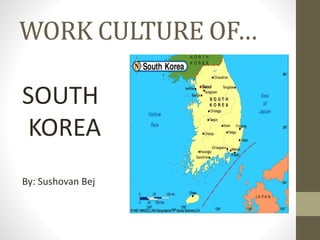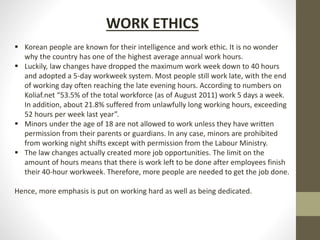South korea work culture
- 1. WORK CULTURE OF… SOUTH KOREA By: Sushovan Bej
- 2. OVERVIEW The contemporary culture of South Korea developed from the traditional culture of Korea, and on its own path away from North Korean culture since the division of Korea in 1943. The industrialization and urbanization of South Korea, especially Seoul, have brought many changes to the way Korean people live. Changing economics and lifestyles have led to a concentration of population in major cities away from the traditional places.
- 3. WORK ETHICS  Korean people are known for their intelligence and work ethic. It is no wonder why the country has one of the highest average annual work hours.  Luckily, law changes have dropped the maximum work week down to 40 hours and adopted a 5-day workweek system. Most people still work late, with the end of working day often reaching the late evening hours. According to numbers on Koliaf.net “53.5% of the total workforce (as of August 2011) work 5 days a week. In addition, about 21.8% suffered from unlawfully long working hours, exceeding 52 hours per week last year”.  Minors under the age of 18 are not allowed to work unless they have written permission from their parents or guardians. In any case, minors are prohibited from working night shifts except with permission from the Labour Ministry.  The law changes actually created more job opportunities. The limit on the amount of hours means that there is work left to be done after employees finish their 40-hour workweek. Therefore, more people are needed to get the job done. Hence, more emphasis is put on working hard as well as being dedicated.
- 4.  The Korean working culture is different from that of Western societies. It is important to treat those who are in a higher position than you with the utmost respect. Obedience is key. This is in contrast to the rather democratic work culture of the Western world, where individuality and challenging the status- quo are tolerated and even sometimes encouraged. In Korean culture, it is those who are at the top who have the first and the last say.  Working environments in Korea are often more formal, and it's important to dress appropriately. Business people often wear dark-coloured suits, even in warm weather.  Teachers will often dress more casually, but it's important to note that fashion in Korea can be quite conservative. Male teachers often feel more comfortable wearing collared shirts and long pants while teaching, while females should not wear low-cut tops and often won't wear shirts without sleeves to school.  Koreans escape from the stresses of work through these social encounters, and can also resolve uncomfortable feelings with their colleagues by dining together. These occasions provide a good opportunity to make friends with Korean co- workers; therefore it is beneficial to attend them. WORK ETHICS
- 5. Thank You





